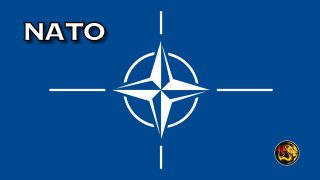
By Stefan J. Bos, Chief International Correspondent Worthy News
BRUSSELS/MOSCOW (Worthy News) – The NATO military alliance has warned its members that they are ill-prepared for a possible war against Russia as red tape hinders troop movements across Europe, prompting an angry reaction from Moscow.
Lieutenant General Alexander Sollfrank, the chief of NATO’s logistics command, said in published remarks that the alliance is running out of time. “What we don’t get done in peacetime won’t be ready in case of a crisis or a war,” added Sollfrank, who leads what is known as Joint Support and Enabling Command (JSEC).
“We need to be ahead of the curve. We have to prepare the theater well before Article 5 has been invoked”, he said, referring to NATO’s collective defense clause, which says an attack on one member is an attack on all.
But that won’t be easy for JSEC, which started operating in the southern German town of Ulm in 2021.
Its job is to coordinate the swift movement of NATO troops and tanks across the continent as well as logistical preparations such as the storage of munitions on the alliance’s eastern flank.
After Moscow invaded Ukraine, JSEC reflected the assessment that NATO, decades after the Cold War was declared over, needed to be ready again for an armed conflict in Europe.
However, the task of quickly deploying forces up to the size of a division with some 20,000 troops, as well as having ammunition, fuel, spare parts, and provisions in place, remains a challenge.
MULTIPLYING LENGTH
While NATO and Warsaw Pact troops in the past faced each other mainly in Germany, the alliance has since expanded some 1,000 kilometers to the east, multiplying the length of NATO’s eastern flank to some 4,000 km in total.
“The expanse of space, the fact that not all forces are forward-based — all this means that the alliance has to be quick in moving troops from their bases to the right spot on the eastern flank,” Sollfrank noted, adding this needed preparation.
“At the heyday of the war in Ukraine, Russia fired 50,000 artillery shells per day. These rounds have to reach the howitzers,” he said. “So you have to set up warehouses — for ammunition, fuel, spare parts, and provisions.”
As it is, NATO forces must navigate various national regulations, stretching from the advance notice required before ammunition can be shipped to the permissible length of military convoys and disease prophylaxis.
“We have a surplus of regulations, but the one thing we don’t have is time,” warned Admiral Rob Bauer, head of NATO’s military committee. “Russia’s war against Ukraine has proven to be a war of attrition — and a war of attrition is a battle of logistics.”
Sollfrank said he would like to see a “military Schengen,” an area of free military passage akin to the political Schengen zone that allows free movement within most of the European Union.
NATO must not prompt a miscalculation in the Kremlin by giving the impression that Moscow might stand a chance to win because the alliance is not prepared, he warned.
TENSION INSTIGATION
However, Russia on Friday called the statement an “instigation of tension in Europe” and a possible threat to its security.
“Europe does not wish to heed our concerns, and Europe pushes aside the invariable principle of indivisible security, which means that they talk about their security to our detriment,” Kremlin spokesperson Dmitry Peskov said.
He accused NATO of “moving towards” Russia and threatened with possible “countermeasures to ensure our (Russian) security.”
Tensions between Moscow and NATO spiked following Russia’s full-scale invasion of Ukraine, leading neutral states like Finland or Sweden to seek membership in the alliance over security concerns.
Russia has repeatedly labeled NATO as a threat to its security and uses Kyiv’s Euro-Atlantic aspirations as one of the justifications for its invasion.
“Europe does not wish to heed our concerns, and Europe pushes aside the invariable principle of indivisible security, which means that they talk about their security to our detriment,” the Russian presidential spokesman said.
“In this case, I want to stress again that it is NATO that is constantly moving its infrastructure close to our border. We are not moving towards NATO’s infrastructure. It is NATO that is moving towards us. This cannot but cause our concern, and this cannot but prompt countermeasures to ensure our security,” he added.
Copyright 1999-2026 Worthy News. This article was originally published on Worthy News and was reproduced with permission.
Latest News from Worthy News
Hungarian Prime Minister Viktor Orbán said over the weekend that Hungary should fear the European Union more than Russia, pledging to dismantle what he called Brussels’ “oppressive machinery” ahead of heated parliamentary elections in April.
U.S. Secretary of State Marco Rubio has pledged to deepen cooperation with a group of four Central and Eastern European nations, including Hungary and Slovakia, despite concerns over their leaders’ perceived authoritarian style and refusal to provide military aid to war-torn Ukraine.
Bulgarian President Iliana Yotova has appointed a senior central bank official as interim prime minister in a bid to steady the European Union nation after years of chronic political instability.
Deutsche Bank, Germany’s largest bank, continued providing banking services to convicted sex offender Jeffrey Epstein years after his 2008 conviction and months before his 2019 arrest, according to U.S. Justice Department documents released Thursday.
Hungary’s main opposition leader, 44-year-old Péter Magyar, said Thursday that he has become the target of what he described as a “Russian-style smear campaign” after he was secretly filmed during a consensual sexual encounter with a former girlfriend in 2024.
The Trump administration has finalized a sweeping reciprocal trade agreement with Taiwan, confirming a 15 percent U.S. tariff rate on Taiwanese imports while securing broad new market access and purchase commitments for American goods.
Democrats are applauding White House border czar Tom Homan’s Thursday announcement that immigration enforcement operation in Minnesota will end next week.







